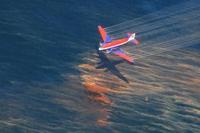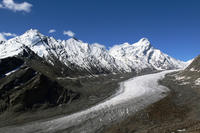-
DHS awards $23.6 million to fund development of new software analysis technology
DHS awarded a $23.6 million grant to the Morgridge Institute for Research at the University of Wisconsin-Madison to create the Software Assurance Marketplace, which, over the next five years, will work closely with developers of new software analysis technology and the open source community to advance the security of software; initial operating capabilities for the Software Assurance Marketplace will include the ability continuously to test up to 100 open-source software packages against five software assurance tools on eight platforms, including Macintosh, Linux, and Windows
-
-
Water resources management in a changing world
Visualize a dusty place where stream beds are sand and lakes are flats of dried mud; are we on Mars? In fact, we are on arid parts of Earth, a planet where water covers some 70 percent of the surface; how long will water be readily available to nourish life here? In the United States, more than thirty-six states face water shortages; other parts of the world are faring no better
-
-
World’s great rivers running on empty
Four of the world’s great rivers are all suffering from drastically reduced flows as a direct result of water extraction, according to new research; the researchers found that in all four river basins, over a long period of time, outflows have greatly reduced as a direct result of increased water extractions, and that urgent changes in governance of water are needed to ensure the systems remain healthy and viable
-
-
Learning the lessons of the BP oil spill

In an attempt to limit the harm of the Deepwater Horizon oil spill in the Gulf of Mexico in 2010, three million liters of dispersant were used to dissipate the oil; on the surface the damage seems limited, but the seabed is covered with a thick layer of gunk; scientist from around the world are now working on models that can be consulted by decision makers when there is another oil spill disaster
-
-
The challenge of securing food and water supplies in the twenty-first century
Participants in the Food Security in Dry Lands (FSDL) conference, held last week in Qatar, agreed that the task of managing food and water resources more efficiently and improving the security of supply are set to become one of the biggest challenges for policy makers in the twenty-first century
-
-
“Soft infrastructure” as storm surge defense alternatives
The flooding in New York and New Jersey caused by Superstorm Sandy prompted calls from Governor Andrew Cuomo and other officials to consider building storm surge barriers to protect Lower Manhattan from future catastrophes. Such a strategy, however, could make things even worse for outlying areas that were hit hard by the hurricane, such as Staten Island, the New Jersey Shore, and Long Island’s South Shore, a City College of New York landscape architecture professor warns; landscapers and engineers say that environmentally friendly “soft infrastructure” would mitigate flood damage without sending harm elsewhere
-
-
Sequestration will have a devastating impact on U.S. research enterprise
Three organizations representing more than 200 of the U.S. leading academic research institutions yesterday launched a Web site that aims to inform policymakers and the public of the impact that the upcoming budget sequester would have on federal funding for university research; the Web site highlights the importance of federally funded university research to innovation, economy, an society
-
-
Himalayan glaciers to shrink even if temperatures hold steady, risking South Asia water supply

Come rain or shine, or even snow, some glaciers of the Himalayas will continue shrinking for many years to come; the most conservative findings of a new research on Bhutan, a region in the bull’s-eye of the monsoonal Himalayas, indicate that even if climate remained steady, almost 10 percent of Bhutan’s glaciers would vanish within the next few decades; what is more, the amount of melt water coming off these glaciers could drop by 30 percent
-
-
Biosecurity paramount to ensure Australia retrains healthy agricultural output
Experts at the State Biosecurity Forum, held ten days ago in Australia, recommend strong partnerships and global strategies to secure protection of present and future agriculture for Western Australia (WA); the participants at the event discussed issues ranging from the effects of climate change and UV radiation on biosecurity to the implementation of computer modeling in agricultural policy making decisions
-
-
Con Ed overcame many obstacles to restore power to NYC
On 29 October Hurricane Sandy slammed into New York City and took out the power in most of Lower Manhattan, even knocking out power to the headquarters of Consolidated Edison’s (Con Ed), the electricity supplier for NYC; due to the flooding in Lower Manhattan, employees had to use rafts to rescue coworkers trapped in the company’s East 13th Street power station; in the days after the storm, as with many other New Yorkers, Con Ed almost ran out of gas, but that did not stop the company from restoring power back to Lower Manhattan less than four days after the storm
-
-
Why typhoid fever pathogen targets only humans

Salmonella typhiis a particularly nasty bacterium that targets only humans and causes typhoid fever, which kills hundreds of thousands of people annually; scientists explain how evolution shaped the pathogen to be so selective
-
-
“Black swans” and “perfect storms” are often lame excuses for bad risk management
The terms “black swan” and “perfect storm” have become part of public vocabulary for describing disasters ranging from the 2008 meltdown in the financial sector to the terrorist attacks of 9/11, but some argue that people in government and industry are using these terms too liberally in the aftermath of a disaster as an excuse for poor planning
-
-
Georgia Tech releases cyber threats forecast for 2013
The year ahead will feature new and increasingly sophisticated means to capture and exploit user data, escalating battles over the control of online information and continuous threats to the U.S. supply chain from global sources; those were the findings made by the Georgia Tech Information Security Center (GTISC) and the Georgia Tech Research Institute (GTRI) in this week’s release of the Georgia Tech Emerging Cyber Threats Report for 2013
-
-
New fluorescence technology pinpoints oil leaks at sea
Cambridge Consultants uses fertility monitor technology in oil leak early warning system; the company has built an oil spill detection technology platform which is capable of detecting the natural fluorescence of even tiny amounts of oil in or on water
-
-
The Coca-Cola model for delivering malaria meds is a success, should be continued
A controversial program that uses the private market to provide affordable malaria treatments to people in Africa has dramatically increased access to care and should be continued; The private-market approach — sometimes called the Coca-Cola model in reference to the soda’s apparent ability to reach remote areas of the world — aims to deliver drugs in regions where the majority of people obtain medicines from shops rather than from district hospitals or clinics
-
- All
- Regional
- Water
- Biometrics
- Borders/Immig
- Business
- Cybersecurity
- Detection
- Disasters
- Government
- Infrastructure
- International
- Public health
- Public Safety
- Communication interoperabillity
- Emergency services
- Emergency medical services
- Fire
- First response
- IEDs
- Law Enforcement
- Law Enforcement Technology
- Military technology
- Nonlethal weapons
- Nuclear weapons
- Personal protection equipment
- Police
- Notification /alert systems
- Situational awareness
- Weapons systems
- Sci-Tech
- Sector Reports
- Surveillance
- Transportation
Advertising & Marketing: advertise@newswirepubs.com
Editorial: editor@newswirepubs.com
General: info@newswirepubs.com
2010-2011 © News Wire Publications, LLC News Wire Publications, LLC
220 Old Country Road | Suite 200 | Mineola | New York | 11501
Permissions and Policies
Editorial: editor@newswirepubs.com
General: info@newswirepubs.com
2010-2011 © News Wire Publications, LLC News Wire Publications, LLC
220 Old Country Road | Suite 200 | Mineola | New York | 11501
Permissions and Policies
